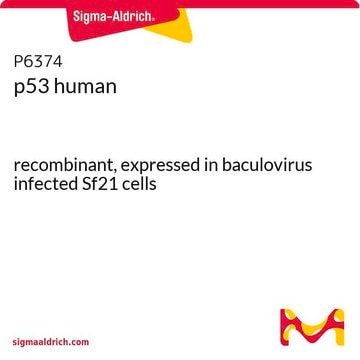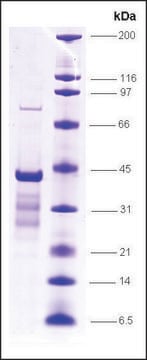SRP2108
p53 (1-81), mutant, GST tagged human
recombinant, expressed in E. coli, ≥80% (SDS-PAGE)
Synonyma:
FLJ92943, LFS1, P53, TRP53
Přihlásitk zobrazení cen stanovených pro organizaci a smluvních cen
About This Item
UNSPSC Code:
12352200
NACRES:
NA.26
Doporučené produkty
biological source
human
recombinant
expressed in E. coli
assay
≥80% (SDS-PAGE)
form
frozen liquid
mol wt
~34.5 kDa
packaging
pkg of 10 μg
concentration
450 μg/mL
color
clear colorless
NCBI accession no.
UniProt accession no.
shipped in
dry ice
storage temp.
−70°C
Gene Information
human ... TP53(7157)
General description
p53 is a tumor suppressor gene expressed in a wide variety of tissues. It is a tetrameric nuclear DNA-binding phosphoprotein. The gene encoding it is localized on human chromosome 17p13.1.
Biochem/physiol Actions
The protein has the capability to induce cell cycle arrest and has a role in DNA repair, senescence and apoptosis. It binds to Simian vacuolating virus 40 (SV40) T-antigen and human papilloma virus E6 protein.
p53 was identified as a tumor suppressor by showing that this protein has the ability to block transformation and to inhibit tumor cell growth. In addition, p53 is a transcription factor capable of regulating the expression of a subset of downstream genes. Mutation of two specific N-terminal residues in p53 (residues Leu22 and Trp23) impairs the ability of p53 to transactivate and has been correlated with its ability to bind TAFII40 and TAFII60 (or TAFII31 and TAFII70) (7, 8) suggesting that one or both of these interactions is important for activation. Mutation of residues 22 and 23 to Ala does not affect binding to TBP, although mutation of these residues to charged amino acids has been reported to disrupt the p53-TBP interaction. Different mutations in p53 gene have been characterized in a variety of human cancers. Loss or mutation of p53 function is highly correlated with tumorigenesis.
Physical form
Clear and colorless frozen liquid solution
Preparation Note
Use a manual defrost freezer and avoid repeated freeze-thaw cycles. While working, please keep sample on ice.
Storage Class
10 - Combustible liquids
wgk_germany
WGK 1
flash_point_f
Not applicable
flash_point_c
Not applicable
Osvědčení o analýze (COA)
Vyhledejte osvědčení Osvědčení o analýze (COA) zadáním čísla šarže/dávky těchto produktů. Čísla šarže a dávky lze nalézt na štítku produktu za slovy „Lot“ nebo „Batch“.
Již tento produkt vlastníte?
Dokumenty související s produkty, které jste v minulosti zakoupili, byly za účelem usnadnění shromážděny ve vaší Knihovně dokumentů.
Cooper GM.
The Cell: A Molecular Approach null
D Michalovitz et al.
Cell, 62(4), 671-680 (1990-08-24)
Mutant p53 can contribute to transformation, while wild-type (wt) p53 is not oncogenic and actually inhibits transformation. Furthermore, wt p53 may act as a suppressor gene in human carcinogenesis. We now describe the temperature-sensitive behavior of a particular mutant, p53val135.
S J Baker et al.
Science (New York, N.Y.), 249(4971), 912-915 (1990-08-24)
Mutations of the p53 gene occur commonly in colorectal carcinomas and the wild-type p53 allele is often concomitantly deleted. These findings suggest that the wild-type gene may act as a suppressor of colorectal carcinoma cell growth. To test this hypothesis
C A Finlay et al.
Cell, 57(7), 1083-1093 (1989-06-30)
DNA clones of the wild-type p53 proto-oncogene inhibit the ability of E1A plus ras or mutant p53 plus ras-activated oncogenes to transform primary rat embryo fibroblasts. The rare clones of transformed foci that result from E1A plus ras plus wild-type
Mutations in the p53 Tumor Suppressor Gene
Noa Rivlin
Genes & Cancer, 2(4), 466-474 (2011)
Náš tým vědeckých pracovníků má zkušenosti ve všech oblastech výzkumu, včetně přírodních věd, materiálových věd, chemické syntézy, chromatografie, analytiky a mnoha dalších..
Obraťte se na technický servis.








